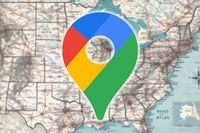In a troubling incident for users of Google Maps, millions have discovered that their cherished Timeline data, which provides a detailed history of their travels and locations, has been accidentally deleted. This decision seems to stem from a significant and problematic update within the popular navigation app.
Earlier in March 2025, a wave of distress surged through the Google Maps community as users reported that their Timeline data was mysteriously disappearing. Despite numerous complaints voiced across social media platforms, it wasn’t until March 24, 2025, that Google characterized the anomaly as a genuine issue, confirmed by a spokesperson who stated, "We briefly experienced technical issues that resulted in the deletion of Timeline data for some users. Only users who had the backup option enabled can recover their Timeline data," as reported by The Verge.
The Timeline feature in Google Maps has been a beloved tool for many users, allowing individuals to revisit their past journeys and note the routes and places they frequented. This data not only served practical navigation purposes but also helped users recall memories associated with various locations—from that quaint restaurant visited during a vacation to a friend's house. However, concerns regarding privacy led Google to its recent policy shift.
Prior to 2024, Google stored Timeline data on its servers, but in pursuit of enhanced privacy, the technology giant transitioned to storing timeline data on users’ devices. This measure meant that while users had improved control over their data, it also resulted in new complications when issues arose, as seen in this incident. This change likely contributed to the widespread deletions that left many users in the dark.
The extent of the issue has been alarming. Users who had relied on this feature now find themselves grappling with lost memories and historical data that may never be recoverable. Complicating matters further, many users did not have the backup option enabled by default, meaning that for the majority, the deleted data appears to be permanently gone. Google did highlight that individuals could potentially retrieve their lost Timeline data if they had opted to keep an encrypted backup when updating their settings—an option buried within the app under the cloud icon. Yet, for those unaware of this functionality, their chances of recovery are slim.
Among the explanations provided, Google confirmed that improper handling during a routine update led to this unfortunate outcome. "It’s unclear how this happened, but we'd wager on a botched Maps update," speculated tech industry insiders, emphasizing the complexities and risks involved when shifting digital hubs like this.
User feedback has reflected a range of emotions. For some, the loss is confined to disappointment, recognizing how vital Google Maps has become in organizing their lives. For others, it raises deeper concerns over how much trusted technology can affect personal histories and how such errors can be prevented in the future. Many users implored Google to ensure that such complications wouldn’t recur, pleading for transparency and improved user settings in the future.
This incident sheds light on a deeper issue pertaining to data management and user dependency on digital services for personal history. The Timeline feature has often been hailed as a powerful tool, yet this mass deletion demonstrates the real risks involved in the reliance upon cloud and local storage practices that might fail at critical moments.
As we move forward, it is essential for users to take an active role in understanding the data choices made by these platforms. Google Maps not only provides paths but also stores memories, and users should ensure their history is safeguarded correctly in this fast-evolving technological landscape.
Moving beyond this specific incident, it is crucial for tech giants like Google to develop strategies that safeguard user data more effectively. Empowering users to control their data and ensuring clearer access to backup functionalities should be a priority. As we continue the dialogue surrounding digital privacy, the importance of user education remains indisputable—actions taken today will serve as lessons for safeguarding tomorrow’s memories.




